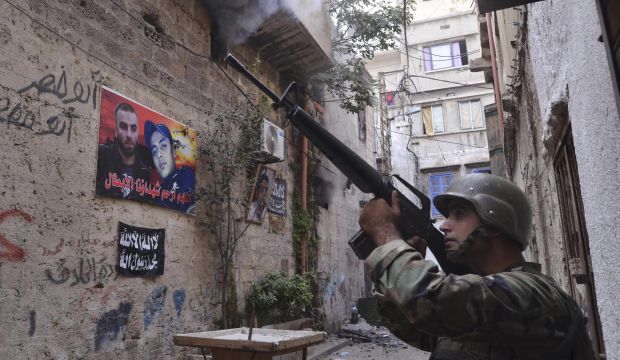
A Lebanese army soldier on patrol in the northern Lebanese city of Tripoli following clashes between Lebanese soldiers and Islamist gunmen, on October 27, 2014. (Reuters/Stringer)
Tripoli and Beirut, Asharq Al-Awsat—Fighting between Islamists and the Lebanese army in the northern city of Tripoli appeared to have stopped on Monday morning, in the latest flare-up in the city of violence spilling over from the conflict in neighboring Syria.
Samir Jisr, a Sunni Muslim politician from the city, told Reuters on Monday the army’s operation to empty the city of the Islamist fighters was now “over” and that the army was carrying out mopping-up operations to clear out any remaining gunmen.
According to eyewitnesses, fierce street battles erupted on Friday, as Islamist fighters believed to be members or supporters of the Al-Qaeda-affiliated Al-Nusra Front and the Islamic State of Iraq and Syria (ISIS) entered the market district of the city.
Security officials told reporters that at least 11 soldiers, eight civilians and 22 gunmen had been killed during the fighting.
Speaking to Asharq Al-Awsat on Sunday, Lebanon’s Interior Minister Mashnouq put the number of Islamist fighters in the city at not above 200, and said they were made up of Lebanese and Syrians citizens.
The Minister warned that the battle would not be “a quick one . . . It will take a long time,” though he added that the Lebanese army would “have the last word” once the fighting was done.
It is unclear at this stage if the army has won a decisive victory in the city, or if Mashnouq’s prediction will be proved right.
Tripoli, the second largest city in Lebanon, has been the scene of periodic outbreaks of violence since the uprising in Syria began in 2011, with clashes between local groups supporting different sides in the conflict prompting the government to deploy troops as peacekeepers on several occasions.
The latest clashes between the army and Islamist militants also comes after fierce fighting between the Lebanese security forces and the Al-Qaeda affiliated Al-Nusra Front in the town of Arsal, on the Syrian border, in August.
Former youth and sports minister Faisal Karami, and who hails from the Tripoli, told Asharq Al-Awsat the army had found fighting in the city difficult due to the need to avoid civilians casualties.
“These fighters are concentrated in areas where there are civilians and children, whom they [the fighters] have effectively turned into hostages, and so the army is finding it difficult to resolve [the crisis] for these humanitarian reasons,” he said.
But reports on Monday said civilians in the city had been evacuated from these areas following a humanitarian ceasefire negotiated between the fighters and local Sunni leaders.
The exact whereabouts of the fighters remain unknown, and some security officials have suggested they may have left the city during the civilian evacuation.
